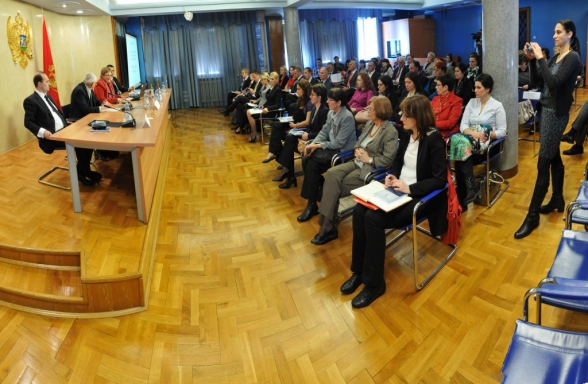At its meeting held today, the Gender Equality Committee of the Parliament of Montenegro organised a presentation of the “Second research on conversance and application of the Law on Gender Equality in institutions of Montenegro”.
The research has been implemented with support of the OSCE Mission to Montenegro, UNDP Office in Montenegro and Ministry of Human and Minority Rights.
Authoresses of the publication with presented results of the research are: Ms Milka Puzigaća, Director of the SCAN Agency for Research and Development from Novi Sad, Ms Marijana Pajvančić, Dean of the Faculty of European Legal and Political Studies in Novi Sad, and Ms Milana Čabarkapa, Teaching Assistant at the Faculty Of Legal Sciences UDG and Ms Slavica Bajić, Assistant Secretary of the Secretariat for Legislation.
Today’s presentation was opened by Chairperson of the Gender Equality Committee Ms Nada Drobnjak, who emphasised the significance of the project conducted in 68 institutions and parliamentary parties in Montenegro during the second half of 2013. It is important to say that the research was initiated by the Gender Equality Committee, so by this process, in the parliamentary system of government, the control role of the Parliament and Gender Equality Committee towards the executive branch – whose basic task is related to application of the law - has been strengthened.
Deputy Head of the OSCE Mission to Montenegro Mr Waldamar Figaj said that the research has been very important, due to the fact that it contributed to higher level of equality in Montenegro and represented a significant and efficient manner for the Gender Equality Committee to perform its oversight function, i.e. the research is a very important basis for improving the oversight role of the Parliament.
Minister for Human and Minority Rights Mr Suad Numanović stressed the importance of researches and said that the issue of gender equality was becoming more and more important, as evidenced by the research. He pointed out that only by changing the awareness of state employees and all citizens, the Law could be implemented in a quality manner, which should result in providing better data obtained by conducting research on the application of the Law.
The research results presented by the authoresses Ms Milka Puzigaća, Ms Milana Čabarkapa and Marijana Pajvančić, among other things, show that of all the documents in which the state regulate the issue of gender equality, the most recognisable is the Law on Gender Equality (53 per cent), but out of the total number of participants in the survey 41% were unable to name any conduct that is considered discriminatory by the Law, which is by 8% less than in 2010. Most participants in the survey (79 per cent) known that by the Law use of words in the masculine gender, as a generic neutral form for masculine and feminine, is considered discriminatory. That's by 18 per cent more than three years ago.









